SUMMARY
This is AI generated summarization, which may have errors. For context, always refer to the full article.
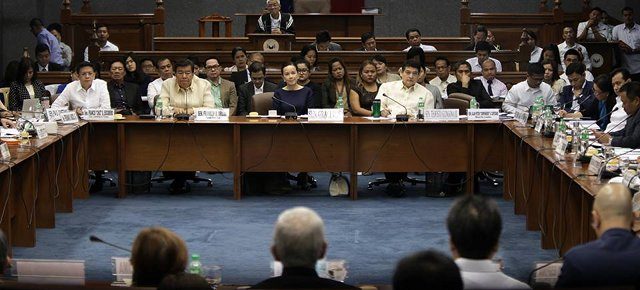
MANILA, Philippines – At a time the public is hungry for answers on the controversial Mamasapano clash, senators say they already “completed the picture” of the incident based on closed-door testimonies of police officers.
Known in parliamentary jargon as executive session, the meetings are now in question as militant groups criticize the senators’ decision to reveal only select information from the hour-long revelations.
“If the senators refuse to divulge the details, then this could only mean that they are willing to go down as accomplices to the greatest cover-up in Philippine history,” said labor group Bukluran ng Manggagawang Pilipino.
The appeal has basis. After all, the encounter that killed 65 people is the biggest security crisis to hit President Benigno Aquino III, whose allies dominate the Senate. At stake in the investigation are calls for truth and justice, the morale of the police and the military, and the fate of the peace process with the Moro Islamic Liberation Front (MILF).
Can’t the Senate really tell all? What is the point of extracting information people won’t know about? Senior senators and longtime Senate staff walk us through the colorful history of executive sessions, explaining that while state secrets are protected, much of what is discussed often ends up as policy and public knowledge.
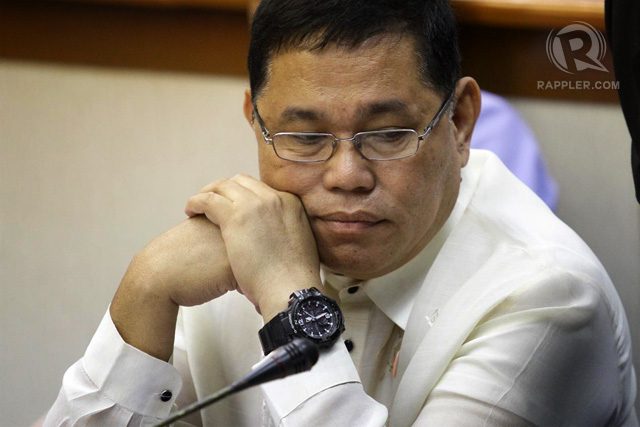
Police narrative, no MILF
Like many procedures in government, the executive session was copied from the United States, where it is known on Capitol Hill as “secret or closed sessions.”
Under the Philippines’ 1987 Constitution and Senate rules, senators can hold an executive session “when the security of the State, or the public interest so requires, and the President so states in writing.”
The discussion is strictly confidential, and a vote of two-thirds of all 24 senators, not a mere majority, is required to lift secrecy. As in this case, senators can collectively decide to release a summary or bring out information through a succeeding hearing.
Among the 39 Senate committees, the blue ribbon, national defense, public order, and foreign relations panels hold the most executive sessions. The Mamasapano probe is a rare combination where accountability of public officers, police and military matters, and diplomatic affairs are all involved in one incident.
Senators refuse to confirm or deny on record what they talked about with resigned police chief Alan Purisima, relieved Special Action Force (SAF) commander Getulio Napeñas, police intelligence group director Fernando Mendez, and two SAF survivors.
Yet the public hearings already revealed the topics resource persons deemed sensitive:
- Mendez – the “intelligence packet” for Malaysian terrorist Zulkifli bin Hir alias Marwan. Mendez also joined Purisima and Napeñas in two meetings with Aquino in Malacañang for a “mission update.”
- Napeñas – the precision-guided bomb plan, the safe exit and contingency plan for the SAF troopers, active operations for terrorist Abdul Basit Usman, American involvement in the mission, and how and why Marwan’s severed finger was given to the US Federal Bureau of Investigation for DNA tests.
- Purisima – if he informed his close friend, Aquino, of the developments on January 25 even while he was suspended for corruption allegations.
Curiously, MILF chief negotiator Mohagher Iqbal and presidential peace adviser Teresita Quintos Deles also asked for an executive session on the “actual situation” between the MILF and Marwan’s whereabouts, but none was held with the peace panels.
Senate public order committee chairperson Grace Poe said no request was made, even if the two said this in open hearing.
The valid and not so valid grounds
Senate insiders say national security is the most commonly cited justification for holding executive sessions. What constitutes state security and public interest though is left to the senators’ discretion.
Senate President Franklin Drilon scoffs at leftist groups’ comments, insisting that revealing all information given in executive session is reckless.
“The identity of the intelligence assets is an example. Now, is that the public interest the militants want to expose? It’s a case-to-case basis. There are higher interests other than disseminating information. The militant groups always have their own agenda,” Drilon told Rappler.
‘The problem with us, senators, is most of us asked the wrong questions. In executive session, they talk freely and reveal many things even if we don’t ask.’
– Senator Vicente Sotto III
Former Senator Rene Saguisag said also falling under national security is treaty-making or a plan to invade “hostile territory.” During his term from 1987 to 1992, the Senate often held executive sessions on closing the US bases.
“The executive [branch] cannot say publicly, ‘This is only our tentative position. Actually, we may settle for money, less territory and shorter term, etc.’ Senator Tito Guingona advised me, confronted by the missus, ‘Deny, deny, deny until you die,’” Saguisag quips in an e-mail to Rappler.
Yet the grounds are not always as compelling. Some witnesses fear for their own safety, or feel at ease without the glare of TV cameras.
Senator Sergio Osmeña III cited the example of the widow of a former lawyer of the Development Bank of the Philippines (DBP) who committed suicide. His banks committee held an executive session when it talked to her as part of an investigation into an allegedly questionable DBP loan in 2011.
Osmeña told Rappler that the Senate wants to prevent a “Junjun Binay scenario,” where the witness just clams up.
On Mamasapano, Osmeña said that Purisima and Napeñas’ revelations on who told Aquino about the clash, and when, can be made public.
“It’s not national security. It might be interpreted as part of national security only in a bigger context of a secret strategy or negotiations, etc,” Osmeña said.
Senator Vicente Sotto III swears by the effectiveness of the Mamasapano executive sessions in “ferreting out information.”
“The problem with us senators is most of us asked the wrong questions,” Sotto told Rappler. “We didn’t get what we want in the hearings because we didn’t ask the right question or we didn’t ask the right person. In executive session, they talk freely and reveal many things even if we don’t ask.”
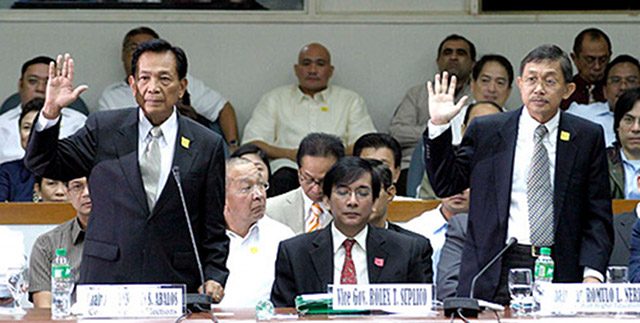
Controversy, contempt and leaks
There is a heavy price to pay for breaking the confidentiality rule. A senator who dares leak information can be expelled while a staff member faces dismissal.
Only the Senate Secretary, Sergeant-at-Arms, and a few staffers are allowed to join senators in the exclusive lounge or hearing room. Sometimes, there are stenographers; on other occasions, video and audio recording, or just mental notes.
Senate employees who attended past executive sessions told Rappler that while utmost secrecy is observed, disclosures are often used to draft committee reports containing legislative or prosecutorial recommendations.
Lawyer Renato Bantug, Drilon’s chief of staff, got to attend two executive sessions. Also the Senate’s executive director for legislation, Bantug said the information is at times cited in footnotes of committee reports, or in cases where a bill is not needed, senators directly convey their feedback to the executive branch.
“To fill in the gaps, it is in the executive session where they formulate or address policy. The thinking of Congress is directly conveyed. That is where it comes out because you cannot make it public,” Bantug said in reference to a meeting that involved foreign relations during the Fidel Ramos presidency.
Another Senate veteran, Blue Ribbon Oversight Office Management head Rodolfo Noel Quimbo, said that under his former boss, the late Senator Juan Flavier, an ethics committee report was deemed absolutely confidential, archived, and remains sealed.
Yet despite the so-called code of silence and honor system, conversations don’t remain private for long.
‘Lawmakers are talkative. They want to get in the good graces of the press, with no satiation for red meat. Tsismis is a high-growth cottage industry in this town without secrets.’
– Former Senator Rene Saguisag
A reporter was almost cited in contempt for writing about the most controversial executive session in recent history: the meeting with former socio-economic planning secretary Romulo Neri in the blue ribbon probe into the NBN-ZTE deal under the Gloria Macapagal-Arroyo administration in 2007. Neri asked for an executive session when asked what instructions Arroyo gave him.
Then Senator Joker Arroyo even filed a resolution to investigate the Philippine Daily Inquirer and its reporter, Juliet Labog-Javellana, for quoting 4 anonymous sources who said he intervened and allowed then Budget Secretary Rolando Andaya to join the session as Neri’s legal counsel, silencing the witness.
Adamantly denying the charge, Arroyo tried to get Javellana to reveal her sources, but the Inquirer invoked press freedom or the Sotto Law. Incidentally, then Senator Benigno Aquino III was among those who supported Arroyo’s resolution.
One of those who witnessed that infamous executive session, Quimbo said the rumor then was that senators were texting during the meeting, and stepping out. To this day, he remains tight-lipped about what actually happened.
Saguisag said leaks are nothing new. “Matters taken up in such sessions up to now appear in tomorrow’s papers, front page. Lawmakers are talkative. They want to get in the good graces of the press, with no satiation for red meat. Tsismis (gossip) is a high-growth cottage industry in this town without secrets.”
For Aquino ally-turned-occasional critic Osmeña, leaks make cover-ups impossible. “There are members there who do not like PNoy and they will leak it. Not all senators are members of the Liberal Party.”
Drilon is disappointed with the leaks from the Mamasapano executive sessions but will not impose sanctions for a simple reason. “Trying to find out who was the source of the leak is almost next to impossible.”
Rappler learned that one senator was so wary about leaks from the Mamasapano testimonies that the lawmaker made a novel suggestion: for Poe to give senators 24 different versions of what happened to be able to trace the blabbermouth.
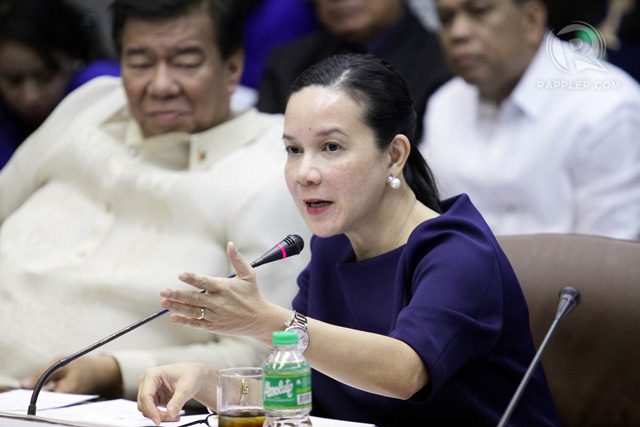
The FOI champion
While executive sessions can be a legitimate investigation tool, the late solicitor general Frank Chavez said that internal rules should not be the primary consideration.
“One of the best services senators can render to the nation is when they waive the secrecy of their exclusive club so that the people may be informed – pursuant to their constitutional right of free access to information – of matters of transcendental importance and extreme public interest,” Chavez wrote during the Neri scandal.
Ironically, the senator leading the probe, feared to be a whitewash, is the champion of the Freedom of Information (FOI) bill in the Senate. Poe’s accountability measure listed executive sessions as an exception to information that can be disclosed.
Still, the call for transparency is not lost on the neophyte senator, who painstakingly explains in every interview that her name is also on the line, and she, too, is not a fan of secret meetings.
“I don’t want executive sessions because it limits us from asking in the open but we ask it when we see that the witness is reluctant to speak. It is the last resort. But as much as possible, an open hearing is more accountable to the public,” she said.
With critics still skeptical, Poe’s mentor Osmeña said they should just wait and see.
“I think you should trust Grace. She will do a good job.” – Rappler.com
Add a comment
How does this make you feel?
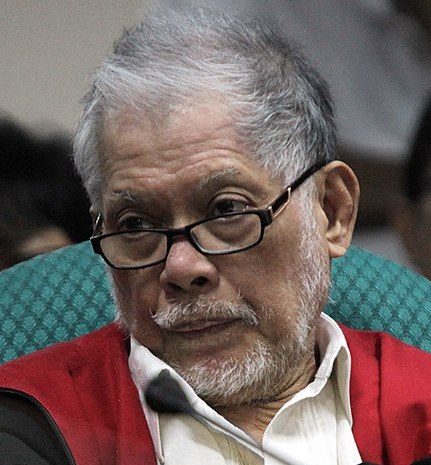
There are no comments yet. Add your comment to start the conversation.